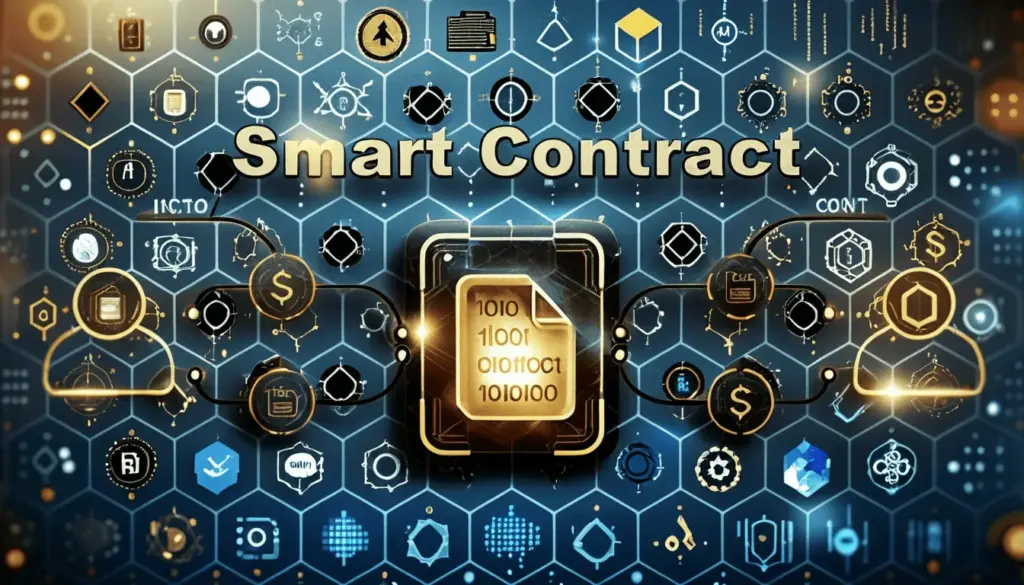In this digital age, a groundbreaking form of agreement is emerging: the smart contract. Built upon blockchain technology, this innovative approach automates the execution of contract terms without intermediaries, maximizing transparency and efficiency. What once involved complex and time-consuming processes is now being streamlined and automated by smart contracts, driving transformative changes across various industries. But is the future of smart contracts a bright one, or does it hold unforeseen risks?

What Exactly is a Smart Contract?
A smart contract is essentially a self-executing computer program stored on a blockchain that automatically enforces the terms of an agreement when predefined conditions are met. Think of it like a vending machine: once the required inputs are provided (conditions are satisfied), the output (agreed-upon action) is automatically released. For instance, in a real estate transaction, once the buyer deposits the earnest money, the transfer of ownership could be automatically initiated. Smart contracts boast several key features:
- Automated Execution: They run automatically based on predefined conditions, enabling swift and accurate processing without human intervention.
- Transparency: All contract details are recorded on the blockchain, making them accessible to all participants, thus preventing tampering and ensuring high transparency.
- Security: Utilizing encryption technology, they maintain robust security, safeguarding against hacking and data manipulation.
- Efficiency: By eliminating the need for intermediaries, they significantly reduce both time and costs associated with transactions.
Diverse Applications of Smart Contracts
Smart contracts are revolutionizing numerous sectors:
- Finance: Automating complex financial transactions and enhancing efficiency in areas like lending, insurance, and derivatives trading. Notably, they are central to the burgeoning Decentralized Finance (DeFi) ecosystem, spearheading innovation within traditional financial systems.
- Real Estate: Streamlining and increasing the transparency of property transactions, including title registration and lease agreements. Smart contracts can simplify intricate processes and foster trust between parties.
- Supply Chain Management: Tracking and managing the entire product journey from production to distribution, improving transparency and efficiency, particularly in food safety and pharmaceutical distribution. They allow for real-time tracking and swift responses to issues.
- Voting: Enhancing the transparency and security of electronic voting systems. Blockchain-based smart contracts can prevent vote manipulation and increase the integrity of the democratic process.
- Digital Content Management: Protecting copyrights and managing the distribution of digital content such as music, videos, and software. Smart contracts can clearly record ownership information and deter illegal copying and distribution.
- Healthcare: Securely managing patient medical records and efficiently processing the sharing and utilization of healthcare data. They can safeguard sensitive information and improve the quality of healthcare services.
- Energy: Automating energy trading and improving efficiency within smart grid systems, enabling direct transactions between energy producers and consumers and enhancing overall energy efficiency.
Challenges and Limitations of Smart Contracts
Despite their immense potential, smart contracts still face several hurdles:
- Legal Issues: A clear legal framework defining the legal validity and liability associated with smart contracts is still largely absent. Establishing relevant laws and regulations is crucial for their widespread adoption.
- Technical Issues: Security vulnerabilities arising from errors or weaknesses in the smart contract code can lead to significant problems. Robust code verification and security audits are essential to ensure their safety.
- Standardization Issues: With various blockchain platforms supporting smart contracts, a standardized development environment and specifications are needed to improve interoperability.
- Real-World Applicability: Smart contracts may face limitations in fully reflecting the complexities of real-world contractual relationships. Tailored development and application, considering the specific characteristics of different industries, are necessary for successful real-world implementation.
- The Oracle Problem: Smart contracts often rely on external data providers called “oracles” to access off-chain information. The reliability and security of these oracles can pose a risk to the overall security of the smart contract.
Conclusion: Navigating the Future of Smart Contracts
Smart contracts are undoubtedly a revolutionary technology with immense potential to transform various industries. While significant challenges remain in terms of legal frameworks, technical security, standardization, real-world applicability, and oracle dependency, the possibilities they unlock are vast. To realize this potential, ongoing research and development are crucial to address these issues and pave the way for a future where smart contracts play a pivotal role in our transactions. The integration of Artificial Intelligence (AI), in particular, holds the promise of further expanding the applications of smart contracts and creating new value streams.


